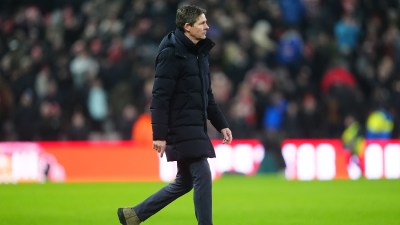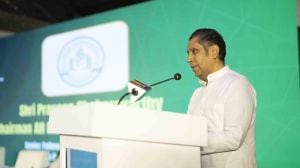A Helping Word
IT was bound to happen. Living in the age of the microwave dinner, us city types have become used to instant remedies 8212; something which...

IT was bound to happen. Living in the age of the microwave dinner, us city types have become used to instant remedies 8212; something which boosts the morale and help refresh and boost positive energy. If our ailments lie in bad karma, the route to nirvana is enshrined in the pages of books 8212; not necessarily pious, but essentially practical. Self-help books have never had a better chance to salve the varied modern-day wounds 8212; emotional crises, estranged relationships, job insecurity, personal growth. New titles, each claiming to be different, have hit the stands. And cashing in on man8217;s existential dilemma are the dozen of authors and publishing houses 8212; both in India and abroad.
Cashing in on the demand, book stores now prominently display the new arrivals in self-help category. So, at Lotus in Bandra, Khushwant Singh8217;s Truth, Love and Little Malice jostles for space with Eckhart Tolle8217;s The Power of Now and David Davidar8217;s The House of Blue Mangoes shares space with Sybil by Flora Rheta Schrieber. Also, Arindam Chaudhri8217;s Count Your Chicken Before They Hatch figures beats Khushwant Singh8217;s well-publicised autobiography on the bestsellers8217; list non-fiction. Who Moved My Cheese by Spencer Johnson, Seven Habits of Highly Effective People by Steven Covey, The Road Less Travelled by Scott Peck and Man8217;s Search for Meaning by Viktor Frankl are new international bestsellers.
8216;8216;Self-help books sell better because people want to know what ails them emotionally and how to get rid of it. They talk to friends, read reviews and then make inquiries about the books on self-motivation, meditation and spirituality8217;8217;, says Virat Chandok, manager at Lotus.
Disintegration of joint family, pressure of work, insecurities and loneliness have forced people to find alternate sources of comfort. R Sriram, CEO of Crossword, says: 8216;8216;Globalisation has created several pscho-emotional problems. Also, the competition is tough today. We want to acquire maximum knowledge in our specialised fields. And to enhance our performance, we fall back on the methods prescribed by self-help books.8217;8217; Sriram refers to Johnson8217;s Who Moved My Cheese and Frankl8217;s Man8217;s Search for Meaning, which have inspired millions across the world.
Making hay while the sun shines or rather while books sell, are the publishers who virtually pounce on 8216;8216;hot, saleable manuscripts8217;8217;. Macmillan, which published the hugely successful You Can Win by Shiv Khera, is planning the books editions in various Indian regional languages. Says Joseph Mathai, Macmillan8217;s general manager: 8216;8216;Khera8217;s book has sold more than 500,000 copies all over the world. Now we are planning his next two books 8212; You Can Lead and There8217;s No Free Lunch.8217;8217;
But what are the criteria publishing houses apply while choosing manuscripts for self-help books? 8216;8216;We look for well-written manuscripts by experts. These books are supposed to provide healing touch to disturbed souls,8217;8217; says Karthika V K, senior editor with Penguin India.
If New Age gurus like Deepak Chopra of Ageless Body, Timeless Mind and Seven Spiritual Laws of Success fame have made a fortune out of healing public agony, our desi gurus have not done badly either. Bhagwan Rajnish, Shri Shri Ravi Shankar The Art of Living, Maharishi Maheshyogi Transcendental Meditation or TM and Ramana Maharishi have spawned a hundred books on healing, meditation and spirituality. Shiv Khera, Swami Rama and Pramod Batra Born to Win are fresh names among the native writers of self-help books.
And they are winning new readers. Sometime ago, author-adman Frank Simoes dismissed self-help books as 8216;8216;fads from the West8217;8217;. 8216;8216;One day I read a book on TM and realised how motivational books give options, and open doors. I have read Chopra and Mahesh Yogi extensively. There8217;s so much to learn from them and get motivated by8217;8217;, says Simoes.
Psychiatrists agree that motivational books do help overcome emotional crises. Dr Anjali Chabaria, president of Bombay Psychiatric Society, says: 8216;8216;I don8217;t prescribe any book to my patients. But if someone is reading a motivational book, I don8217;t stop him. These books are not treatment in themselves; they help heal the trauma. They are catalysts in the healing process.8217;8217;
Motivational guides. Alternative healers. Stress busters. Tomes to overcome trauma, or the road to a better you. Choose your moniker now, for they are here to stay.
- 01
- 02
- 03
- 04
- 05






























